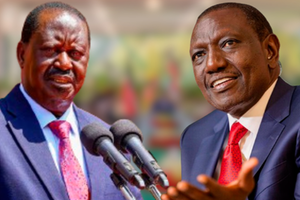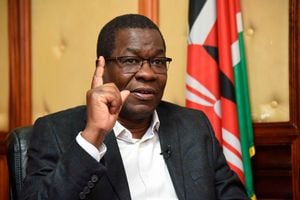
National Treasury Cabinet Secretary John Mbadi says the government will roll out a unified payroll system to weed out ghost workers.
Before the 2010 Constitution came into force, being an elected politician was a sure ticket for one to make it to the Cabinet — whether or not the President’s pick was an erudite professional who had plunged into the metaphorical dirty game or an illiterate sycophant whose only certificate was loyalty. A Cabinet minister was expected to play politics while implementing policies as the Permanent Secretary (later known as the Principal Secretary) remained the technocrat.
However, the role of the Cabinet Secretary was altered radically after the current Constitution was promulgated, with the president required to appoint technocrats. And in instances where politicians were chosen, they were to keep off politics.
While this has been the case on Paper, both the Uhuru Kenyatta administration (2013-2022) and the current government of President William Ruto have signalled the need to have Cabinet secretaries with political muscle who can be deployed to the grassroots to explain government policies or projects and fight fires when necessary.
This has seen many Cabinet secretaries being picked from the political arena owing to the manner they relate with the public easily. The direction has become more apparent this year after President Ruto picked key allies of opposition leader Raila Odinga as Cabinet ministers in the so-called broad-based government.
When President Ruto embarked on crafting the new broad-based Cabinet after Gen-Z protests forced him to send the initial one packing to assuage their anger, he picked the first batch of 11 nominees.
Out of this, he retained six of his initial 22 Cabinet secretaries and named five new faces.
But he ensured that he had politicians who included then Interior Cabinet Secretary Prof Kithure Kindiki (now Deputy President), Mr Aden Duale (Defence and later moved to Environment), and Ms Alice Wahome (Lands, Public Works, Urban Development and Housing),
The new faces to Cabinet were, Mr Julius Migos Ogamba (Education) who was picked as running mate in the last Kisii governorship race and others from Raila Odinga’s ODM party, all politicians. They include Former Kakamega Governor Wycliffe Oparanya (Cooperatives and MSMEs) former Ugunja MP Opiyo Wandayi (Energy and Petroleum), former Mombasa Governor Ali Hassan Joho (Mining, Blue Economy and Maritime Affairs) and former ODM Chairman John Mbadi who is running the Treasury and Economic Planning docket.
In the recent past, they have come out as the biggest defenders of Dr Ruto who less than a year ago they were criticising at every opportunity.
For some, their Road to Damascus moment continues to astound but for the President, the mixed bag means better articulation of his government’s policies to the masses, his handlers say.
But with intense lobbying to include more politicians into the Cabinet in the spirit of broad-based government, especially after the president met his predecessor Uhuru Kenyatta this week, career ministers are not sitting pretty in the fast-changing political landscape.
There is a possibility that the president is considering more politicians to his Cabinet in the spirit of accommodating his new political allies.
A number of them who spoke in confidence expressed fears with the swelling reports of a looming reshuffle. The ongoing political realignments and pacts ahead of the 2027 elections, especially after the political instability caused by the impeachment of Mr Rigathi Gachagua as deputy president, have only intensified the anxiety.
“We hope that the president is still able to find a balance between ministers of varied backgrounds even as he accommodates everyone in the fluid political architecture,” one such Cabinet Secretary, who believed he has little political capital despite being a consummate professional, told Nation in confidence.
Mr Joshua Nyamori, an advocate of the High Court and a political commentator, agrees that technocrats are facing the biggest challenge in people management.
He recalled when ministers were chosen from within Parliament and came with constituencies.
“During this period ministers came with voters and supporters on their backs and this meant that they acted as pillars and support for the President. As it stands some technocrats do not understand politics and despite performing well, they add no value to the President politically,” said Mr Nyamori.
This to him, burdens the President because he has to now talk about issues in every ministry.
He, however, states that the inclusion of technocrats in Cabinet helps in injecting expertise and experience needed especially for reforms in government.
The advocate believes that socioeconomic development requires theoretical knowledge and expertise that can be found by bureaucrats from academia and corporations.
“Remember even President Daniel Moi, when faced with economic challenges, had to establish the Dream Team that comprised experts from various fields to first give confidence to stakeholders and also assure donors that the country was on a reforms path,” said Mr Nyamori.
Dr Ruto is not the first President to do it. He appears to have followed the same script his predecessor used, including politicians to help articulate government policies better as well as plan for future political endeavours.
During the swearing-in of the current Deputy President, the Head of State admitted that he felt very lonely at the presidency having to articulate projects and policies his administration was implementing by himself, while his deputy remained mum choosing to play politics.
“The President was very lonely and had to move across the country and carry out town hall meetings to explain what he was doing for the people. But now with the inclusion of the likes of Mbadi, Wandayi and Joho in Cabinet, you can tell that things have changed,” said Mr Nyamori.
Mr Daniel Orogo, a governance expert, echoed Mr Nyamori’s sentiments, adding that the public had built hopes on technocrats to deliver more than politicians, but this has not been the case.
“We had projected that experts in government would remedy political appointees and reduce the noise and corruption in government, but this has not worked. Technocrats are too conservative in articulating the government policies and convince the masses of what they are doing in their dockets, however good they are,” said Mr Orogo.
Nandi Senator Samson Cherargey feels the composition of the Cabinet should be legislated.
He says he has proposals in the controversial Constitution of Kenya (Amendment) Bill, 2024 that created an uproar from the public since it had proposed an extension of term limits for the President and other elected leaders.
“Among my proposals in a Bill I will be moving in the Senate next year is having MPs serve as CSs. This will cut the wage bill because as a minister they will only be earning allowances.
Kisumu Governor Prof Anyang’ Nyong’o, however, feels the success of a cabinet minister purely depends on the individual.
“You can bring lawyers, doctors or engineers in the cabinet, but performance purely depends on the individual and not necessarily having politicians or technocrats. This cannot be cured by legislation since it is the president's prerogative to choose who he feels can deliver his agenda,” said Prof Nyong’o who once served in President Mwai Kibaki’s cabinet.













